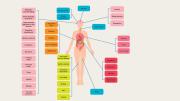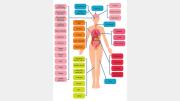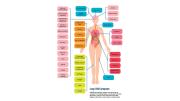Could a healthy lifestyle protect against long COVID? An analysis of data from the long-running Nurses’ Health Study II by Harvard T.H. Chan School of Public Health researchers finds that among these mostly white, middle-aged females, those with five or six of six healthy lifestyle factors had a significantly reduced risk of post-COVID complications. This association suggests the need for further study to determine if the relationship is causal, and if so, whether adopting these healthy habits might be protective against long COVID, defined as continuing symptoms more than four weeks after a COVID infection. The six healthy lifestyle factors assessed included a healthy weight (defined as a body mass index of 18.5 to 24.9); never smoking; at least two and half hours of moderate to vigorous physical activity per week; moderate alcohol intake (defined as five to 15 grams per day); high diet quality (upper 40 percent of the Alternate Healthy Eating Index-2010 score); and 7-9 hours a day of sleep.
Research fellow Siwen Wang, senior research scientist Andrea Roberts, and colleagues write that if these associations were causal, 36 percent of the post-COVID complications in the study would have been prevented if all the nurses had five to six healthy lifestyle factors. The results were comparable when long COVID was defined as at least two months of symptoms post-infection with COVID, and when the researchers looked only at those participants who had ongoing symptoms.
Of the six healthy lifestyle factors, two appeared to be more important than the others: healthy weight and adequate sleep. Healthy weight has previously been identified as associated with a lower risk of post-COVID complications, note the researchers, but adequate sleep had not been. In their study, they speculate about causal mechanisms, noting that all six factors are known to be anti-inflammatory, and that “persistent inflammation has been implicated in post-COVID complication symptoms related to multiple organs.” (Read a detailed report on long COVID, including inflammation factors, here.) Unhealthy lifestyle factors may also disrupt the immune system’s ability to distinguish infected from healthy tissue. Finally, obesity, smoking, physical inactivity, and excessive alcohol intake predispose individuals to blood-clotting abnormalities— another pathology often seen in long COVID patients.
The study included more than 32,000 healthcare workers who had reported on their lifestyle habits. Of these, 1,981 who subsequently became infected with COVID were asked about their long COVID. Healthy lifestyle factors reduced the post-infection risk of all symptoms except smell or taste problems and headache. Because only 36 women had all six healthy lifestyle factors, the researchers combined those with five or six such factors into one cohort for the purposes of the study. These women had half the risk of developing post-COVID complications, compared to women who had no healthy lifestyle factors.
Given that somewhere between eight million and 23 million Americans have developed long COVID, the syndrome is a major public health burden. Mitigating factors, write Wang and Roberts, merit further investigation.











